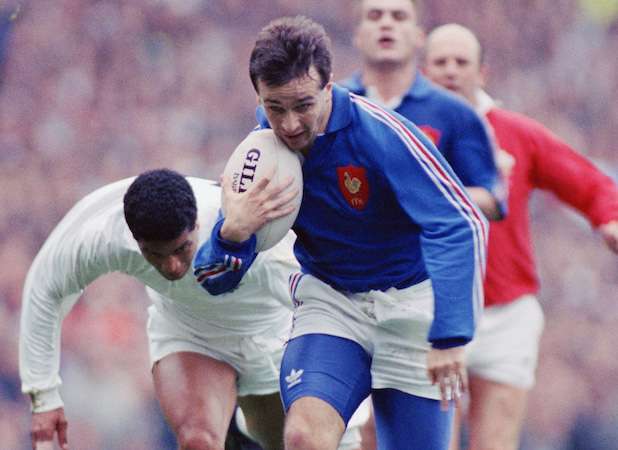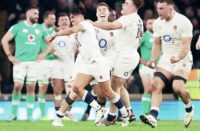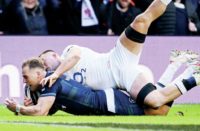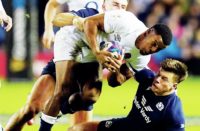 Browsing through a bookshop the other day, I picked up a copy of The Sunday Times Great Sporting Moments of the Twentieth Century. Flicking through the pages, I came across a description of the 1991 Grand Slam game between England and France and, in particular, a try that was arguably the best ever scored in the five Nations.
Browsing through a bookshop the other day, I picked up a copy of The Sunday Times Great Sporting Moments of the Twentieth Century. Flicking through the pages, I came across a description of the 1991 Grand Slam game between England and France and, in particular, a try that was arguably the best ever scored in the five Nations.
A try, according to the book, that began when Serge Blanco, from behind his own try line, collected the ball and ran for 80 metres before passing to Philippe Saint-Andre who scored the try.
Now, it may be that my memory is not as good as it was but if I remember correctly, the whole thing was actually started by Pierre Berbizier, who caught the ball, held it and bent over.
We, having thought he touched it down turned and retreated towards the 22 to await the kick. He ran slightly across and then passed the ball to Blanco who ran about 20 metres across the field behind the try line before moving five metres into the field of play and passing to Grégoire Lascubé. He straightened and ran up field by the touchline for around 10 to 15 metres and passed to Philippe Sella, who cut in-field where I tackled him just after he passed to Didier Camberabero. In those days, you always finished your tackles against the French, even if they passed the ball, to stop them re-joining the play.
Camberabero ran up to the French 10 metre line, chipped the defenders, regathered his own kick and, as a number of defenders closed in, crossed kicked to the middle of the pitch inside our 22 where Saint-Andre gathered the ball and just outpaced a desperate diving tackle attempt by Jerry Guscott to score between the posts.
Fortunately, we went on to win the game and the first of our successive Grand Slams but the legend of Blanco's part in the try has continued and grown from the small but significant second person break to the instigator and main player of the whole thing.
In writing this, I am not trying decry the stunning career of the great French full-back but merely trying to show how even the smallest exaggeration can grow and be taken as fact and then impact on the perceptions of those who follow the game from afar.
The enhancement of Blanco's try scoring abilities does no harm to the game, but the recent embellishment of the figures of those injured in the game through tackling could have a dramatic and damaging impact on all levels of sport participation.
If tackling is stopped in the school game, because of the risk of potential injuries, this would inevitably lead to no tackling in any youth rugby in England, thereby destroying the prospects for the international team and the whole of the adult game.
Introducing contact at adult level for the first time would almost certainly increase the number of serious injuries so dramatically as to make the game unsustainable in its current form.
From playing a game where the only contact would be the occasional accidental collision to teaching fully developed adults how to make full contact tackles virtually overnight, would be a nightmare.
What I find most lamentable about this whole episode is the fact that these so-called academics appear to have little or no concept or even concern of the likely impact on the long-term health of all children should their recommendations be accepted.
If the idea that any activity that has even the slightest risk attached is to be banished from the school curriculum, children would not be allowed to take part in any form of physical activity (including running, skipping, or even walking to school) because every physical act (whether sport or play) contains some inherent risk of injury no matter how slight.
The logical conclusion of the academics letter is that children no longer have access during school time to any form of physical recreation – which in a time where we know the increase in child obesity is projected to cause major health problems in the future adult population, seems ridiculous.
While any injury at any age is regrettable, unfortunately no matter how much we try to protect our children, injuries will still occur.
In my opinion there is less of an injury risk for children taught to play sports in a structured controlled environment with rules on a grass pitch rather than run around playing unstructured, unsupervised games on school concrete play grounds.
James Haskell's call for stadium replays of foul play to be banned – arguing that referee Romain Poite was influenced by repeated slowed motion viewings of the tackle, making it appear more savage than it actually was – does have a flaw.
If it were true that referees, particularly Poite, are influenced by the continual slow motion replays and crowd reaction to them, Poite would surely have sent Mike Brown to the bin. The slow motion replays of the Conor Murray incident were exceptionally graphic and yet the only action Poite took was to sin bin Danny Care for not releasing!
If the replays were taken out of the game it would be unfair on the 82,000 plus fans that have paid a lot of money to see the game live who want to see what all the fuss is about when a TMO interrupts the game.


























